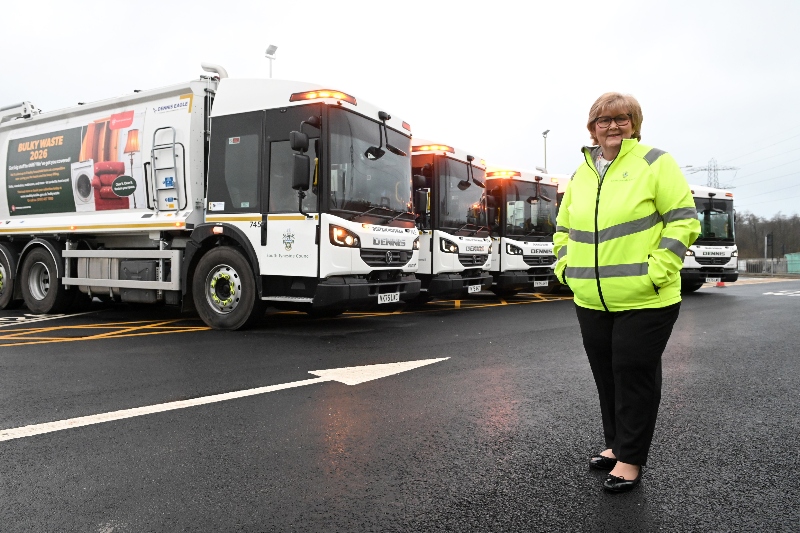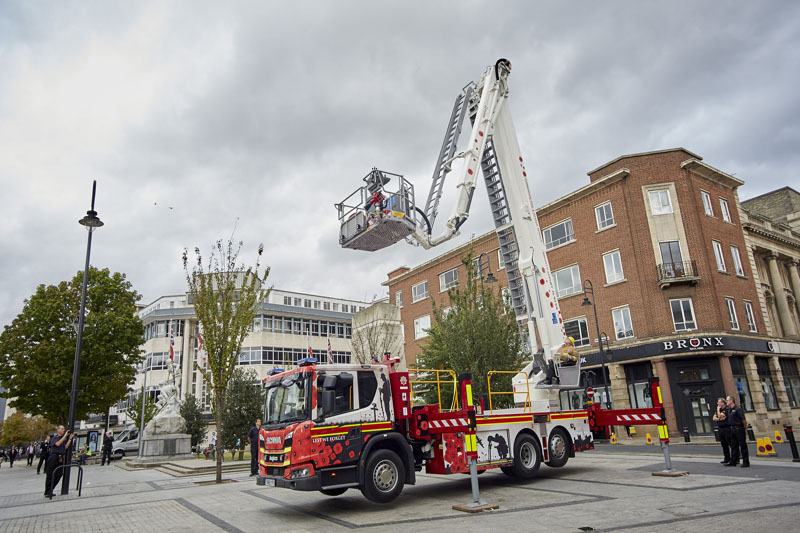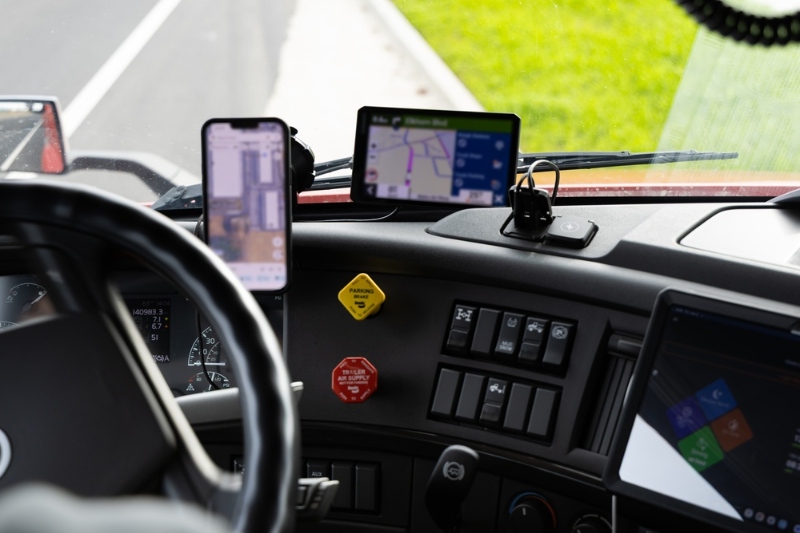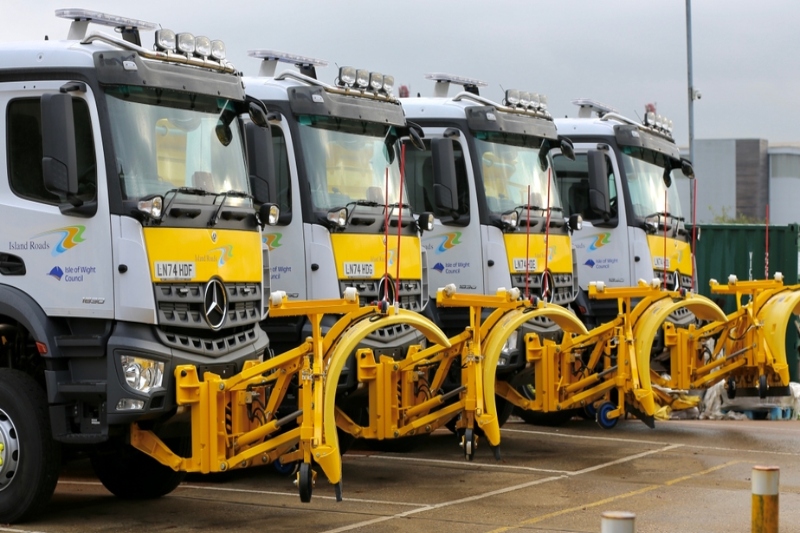This year's RWM ' held at the NEC in Birmingham ' saw the launch of an unusual new vehicle that is set to revolutionise recycling practice in the UK and Ireland, writes Ann-Marie Knegt.
Romaquip (Ireland), known for manufacturing winter maintenance equipment, designed the new Kerb-Sort kerbside recycling vehicle in collaboration with Bryson Recycling.
Belfast-based Bryson Recycling has been delivering kerbside recycling services for over ten years. The company required an increase in productivity and a more streamlined collection system. Bryson Recycling needed to increase their ability to integrate extra materials so that food waste and difficult bulky items such as mixed plastics, card and cartons could be included in the collection process.
In the past, Bryson had been using a vehicle designed to its own specifications, which was being manufactured by a local coach builder in Northern Ireland. Romaquip was approached by Bryson Recycling to design a recycling truck to meet its needs. Romaquip reviewed the existing Bryson kerbside collection body and proposed a totally new design, in order to produce a new more efficient product, which could provide a 4-tonne maximum payload on a 12- tonne chassis.
The new body design was required to enable all unloading procedures to be carried out by the driver from the safety of the vehicle cab. The company also proposed that the vehicle should significantly reduce current maintenance costs and provide an extended useful life span. Romaquip has 25 years experience in the design and manufacture of municipal vehicles principally in the winter maintenance area.
Technical Director for Romaquip, John McKeown adds: “We have a lot of experience in dealing with electronics, electrical harnesses, sensors and fabricated body parts operating in a highly corrosive environment. This knowledge was used to good effect during the design of the new vehicle.
“The Kerb-Sort has been designed to be the most efficient and intelligent kerbside collection vehicle on the market. An unparalleled range of materials can be collected in a single pass including paper, cardboard, mixed plastics, glass, cartons, textiles, foil, batteries, hand tools and food. The unique hydraulic onboard compaction system ensures a high payload of approximately four tonnes on a 12-tonne chassis and provides a storage capacity of around 38 cubic metres.”
The Kerb-Sort is built from the highest quality components, including high-grade stainless steel and aircraft quality aluminium, resulting in it being extremely robust and non-corrosive, which also helps to keep it looking smart and clean. It was designed with operator safety as a high priority, and as a result it has a number of innovative safety features, including a unique glass pod to reduce the noise levels while collecting glass.
The chassis has been specified to achieve an average 10mpg and to ensure the operators have a low one-step entry cab.
The Kerb-Sort recycling body has been designed as a space frame structure with laminated panels to provide a very rugged but light assembly. The upper deck has a volume of approximately 19.5m3. A hydraulic elevating and compaction system is used to achieve a market leading storage capacity. A load cell system has been integrated into the CanBus operating system to provide total monitoring of the compaction process to protect the Kerb-Sort kerbside recycling vehicle upper deck against overloading.
The hydraulic system has been designed to be fully programmable and can be customised to specific customer requirements. The hydraulic system has electronic digital proportional control of pressure and flow for each individual hydraulic circuit. Romaquip has designed the hydraulic system to require low oil pressure and low oil flows to operate the majority of the hydraulic functions.
Hydraulic cylinders are fitted with stainless steel piston rods. The hydraulic circuits use stainless steel hydraulic fittings, stainless steel hydraulic pipes and mining quality hydraulic flexible pipes are used for very high reliability and low maintenance. The high quality bent axis piston hydraulic pump is used for high reliability and long life.
All the hydraulic valve electrical solenoids, hydraulic pressure and hydraulic filters are monitored through the CanBus control system. The CanBus control system monitors and logs any potential exceptions by time and date with an acknowledgement by the operator required. The CanBus system is designed to simplify the maintenance and trouble shooting process.
The ultra modern CanBus system monitors all the electronic proximity transducers, interlocks and all the electrical wiring harness. The advanced CanBus monitoring system delivers a very user-friendly diagnostic system which requires a minimum of training and enables easy operation. An icon system with intuitive prompting guides the service engineer step-by-step through all the diagnostic functions.
Due to the use of stainless steel for all pivot points and the fitting of polymer bearings maintenance has been kept to an absolute minimum. Because stainless steel and aircraft quality aluminium are used for the body construction, repainting of the body is not required.
John explains that the recycling vehicle is built to a very high specification and features a corrosion-free, stainless steel space frame with high tensile aluminium and composite panels to provide a long life span and no corrosion.
“It is very efficient to operate with only two people ' one driver and one loader. However a driver plus two loaders is also an efficient team when collecting at high-density short routes.
“The Kerb-Sort kerbside recycling vehicle can collect substantially more material on each route, so rounds can be made longer and waste operators can reduce the number of vehicles required to deliver a collection service,” he adds.
Low-level loading and automated handling of some materials make completing collection rounds incredibly quick. The vehicle offers fuel consumption of around 10 miles per gallon on a typical collection round. Unloading is controlled automatically from the cab, with a full vehicle offload taking approximately seven minutes, leaving more time for collections. Service costs will be significantly lower and the planned replacement programme can be extended which will result in a major capital cost expenditure saving.
Materials are fully contained in different sections of the vehicle, as its design makes collection and sorting easier for the crew. “Waste operators will find that the quality of materials they collect when using the Kerb-Sort is very high,” continues John. “This means they have the option to sell the materials to local companies for remanufacturing, rather than sending the materials further afield. This option helps to support the local economy and create local jobs. The only operation required at the bulking depot is to separate plastics, cans and cartons which are collected in the upper deck of the Kerb-Sort. The rest of the operation is a simple bulk-and-bale process.”
Gary Hanna, Kerbside Operator for Bryson Recycling explains that the new vehicle has strongly improved working conditions for the recycling staff.
“The Kerb-Sort is easy to drive, with airbrakes, air suspension, reversing cameras and proper rear view mirrors. It also is easy to operate, provides much more capacity and is fast to unload.” Aileen Monahan, Operations Manager, Bryson Recycling, has found that the Kerb-Sort increases the productivity of collection runs:
“It enables us to increase the streamlining of rounds, by providing more loading volume and cleaner waste fractions. The Kerb-Sort has also removed a number of health and safety considerations for our operators. The residents of Conwy Council in Wales have also benefited from the introduction of the Kerb-Sort by waste manager for the Council, Andrew Wilkinson.
“The Romaquip vehicle is a perfect fit for our weekly recycling collection service. Food waste needs to be collected weekly and to be able to collect the food on the same vehicle as all the other materials saves fuel and labour costs and gives Conwy residents the weekly recycling collection they prefer. As the materials are segregated on the vehicle, we can ensure that we control the quality and get the highest price available on the market ' money which is used to fund services when revenue budgets are being cut.
We are really pleased with the overall build quality and in particular the thought that has gone into every aspect of the design. Since we commissioned the Romaquip vehicles, our recycling rate has gone up from 44% to 54% and we expect it to rise again as more homes join the scheme. The best recommendation I can give is to watch one of these vehicles tip off nearly four tonnes of clean, segregated, high-value materials at our bulking station. It's a fantastic reminder of why we recycle and why it's important how we recycle,” concludes Andrew.






